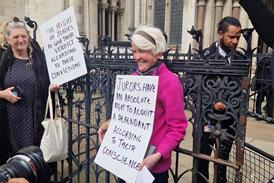A junior solicitor who left a suitcase with sensitive documents on a train – then lied to her firm to buy herself time to find it – has been struck off the roll.
Claire Louise Matthews had been working in the Birmingham office of national firm Capsticks for a month when she left a colleague’s briefcase on the train on her commute home.
Matthews told the Solicitors Disciplinary Tribunal she was ‘overcome by uncontrollable fear, anxiety and panic’ in the following days. Six days after losing the briefcase she told a colleague that she had left it at home, then a day later she emailed her supervisor to say it had been left on a train that morning.
The briefcase contained a matter file for a sensitive case involving a litigant in person who had made a claim against the Solicitors Regulation Authority. Capsticks is regularly instructed by the SRA for its regulatory and litigation work.
The SRA said Matthews’ conduct was not a ‘moment of madness’. Rather, her conduct was self-serving and her only motivation was to protect herself against the risk, as she perceived it, of jeopardising her employment.
Matthews, who qualified less than a year previously, represented herself at the tribunal and denied acting without integrity and being dishonest. She submitted she had desperately wanted to tell her supervisor but was fixated on doing this face-to-face. She described the days after losing the briefcase as the darkest of her life: she barely ate, slept or showered in that time, and she had been ‘haunted’ by that period for almost two years since. Her sister submitted that Matthews’ behaviour was so erratic during these days that she hid her balcony door key.
The tribunal found Matthews had been aware the briefcase had been lost for almost a week when she first lied to a colleague about it. She had conducted herself in the office as though nothing was amiss and had specifically lied in the email about the timescale of events. She was found to have acted dishonestly by seeking to conceal the loss from her colleagues by giving them untrue information.
The SRA had claimed £55,000 in costs, based on its need to instruct another firm, Fieldfisher, due to the conflict with Capsticks. Fieldfisher had charged a £380 hourly rate for a panel solicitor.
Matthews, who now earns £9 an hour in a temporary call centre job, said she was being punished for the outsourcing of the prosecution and that hourly rates were excessive and not commensurate with the complexity level of her case.
The tribunal agreed the rates were too high and had the effect of penalising Matthews for the conflict experienced with Capsticks. There had been ‘significant and unnecessary’ duplication of work by the SRA and costs were cut to £10,000.


















![David Lester (senior partner at Blythe Liggins), Darryl Barnes, Jagdeep Sandher (head of dispute resolution at Blythe Liggins)[4]](https://d1d8vslyhr7rdg.cloudfront.net/Pictures/274x183/4/2/8/116428_davidlesterseniorpartneratblytheligginsdarrylbarnesjagdeepsandherheadofdisputeresolutionatblytheliggins4_981603_crop.jpg)







